Publications
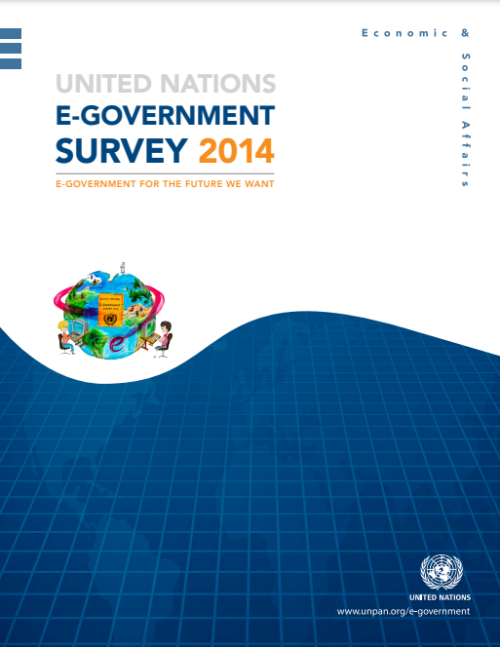
E-government—digital interactions between governments and people—varies greatly among and within regions, but most countries are making progress on providing greater access, according to the 2014 UN E-Government Survey launched today. The findings show that the Republic of Korea tops the global e-government ranking, and that Europe remains first among regions.
The report also shows that many countries are expanding electronic participation, utilizing more mobile and social media tools, expanding usage and making more government data available online. However, challenges remain, such as lack of resources, digital inequalities and a lack of leadership for e-government.
“E-…
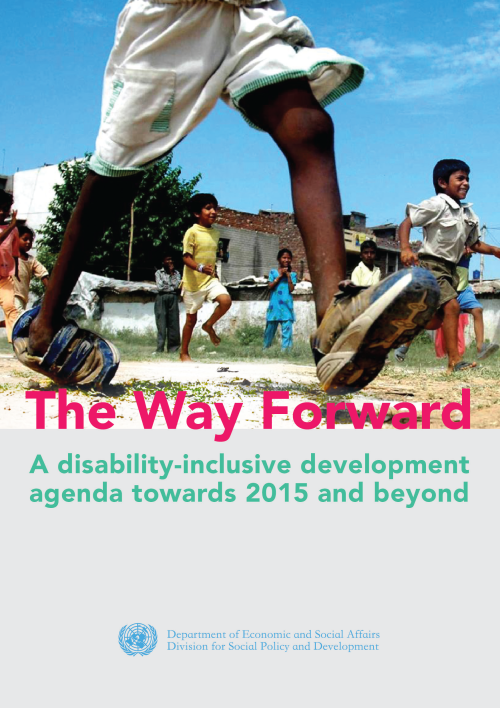
On 23 September 2013, the General Assembly convened the first ever High Level Meeting on “the Realization of the MDGs and other internationally agreed development goals for persons with disabilities.” During the opening segment, Member States unanimously adopted the Outcome Document, which is reproduced in this brochure.
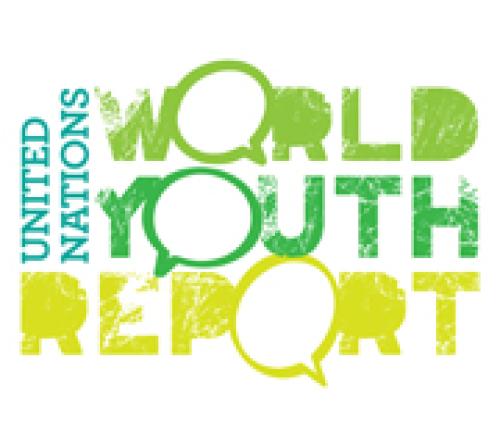
The report is based on the experiences of young people affected by migration and relates the stories of individuals as they move to new lands. About half of the young international migrants are women and girls, and 60 per cent of young international migrants live in developing countries. The report primarily focuses on the experiences of international migrants, but notes that many young people are internal migrants who move within their home countries.
The report outlines the global situation of young migrants by highlighting some of the concerns, challenges and successes experienced by young migrants as told in their voices taken from a series of online consultations and surveys…
The experience from the Millennium Development Goals has shown that well-defined, objectively measurable indicators can help to maintain focus on internationally agreed development goals and targets, while keeping the world informed of achievements, problem areas and emerging issues.
Looking ahead to the post-2015 development agenda, it will be important to develop a robust monitoring system that draws on traditional data collection methods and innovations in statistics and data collection to develop a monitoring framework that can measure progress on the various thematic areas.
While it is still too early to define a set of indicators and targets for the development…
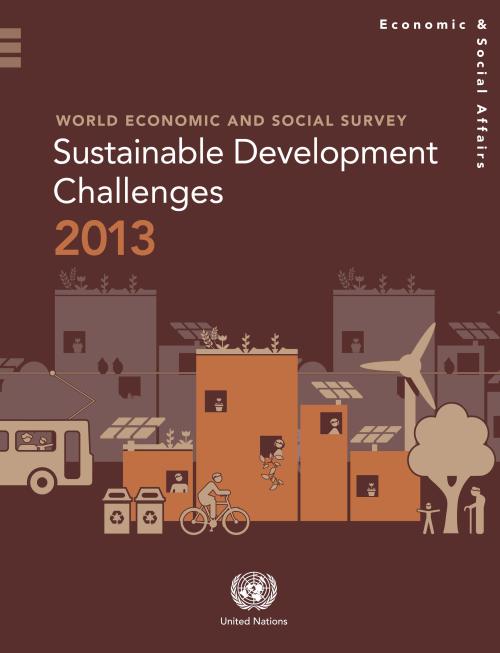
New strategies are needed to address the impacts of rapid urbanization around the world, including increasing demands for energy, water, sanitation, public services, education and health, according to the World Economic and Social Survey 2013.
The 2013 Survey examines the many challenges that must be addressed to achieve sustainable development. The United Nations Conference on Sustainable Development—Rio+20--set out a framework for action and follow-up across a wide range of issues and the Survey zooms in on three critical challenges – food security, energy transformation and sustainable cities.
According to the Survey produced by the UN Department for Economic and Social…
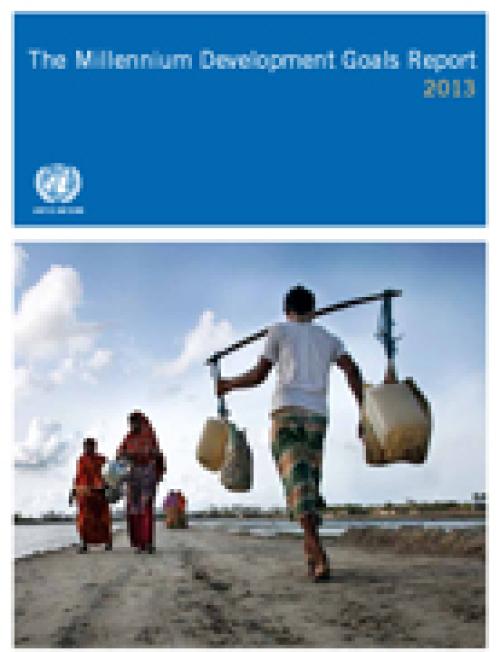
“The Millennium Development Goals have been the most successful global anti-poverty push in history,” Mr. Ban said. “The MDGs have proven that focused global…
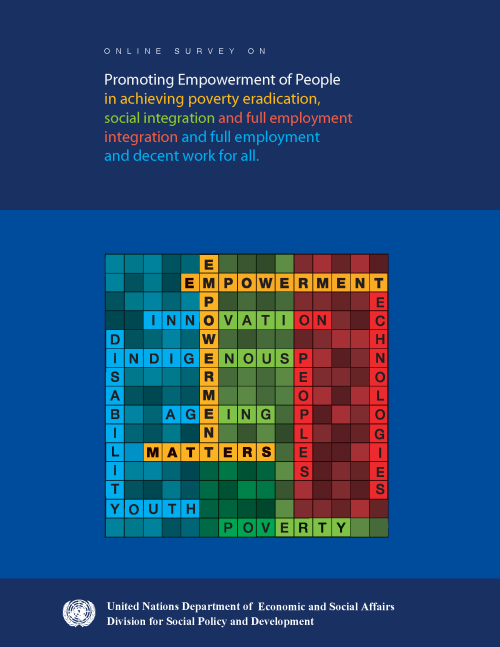
UNDESA-DSPD, from 8 August to 5 September 2012, conducted a global online survey to gather inputs for consideration by the 51st session of the Commission for Social Development (CSocD), which took place from 6 to 15 February 2013.
The survey enabled the public worldwide to respond to a set of questions that were related to the priority theme of CSocD on “Promoting empowerment of people in achieving poverty eradication, social integration and full employment and decent work for all”.
The responses collected and selected from the first question “Empowerment: What does it mean to you?” was published in a separate booklet.
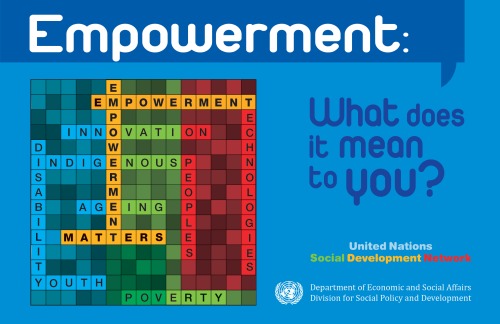
The “Definitions of Empowerment” represents a collaborative effort, made possible by the answers received from people all over the world on the Empowerment theme. Their invaluable contributions were essential for the preparation of the Empowerment Publication.
In order to collect people’s ideas and experiences, the Division for Social Policy and Development (DSPD) of UNDESA launched an on-line survey on “Promoting Empowerment of People”.
We were glad to receive tens and tens of responses from young individuals, persons with disabilities, older persons, and people working for various institutions and organizations committed to social development issues. Their keen interest…
The report presents the yearly assessment of global progress towards the MDGs, highlighting several milestones – three important MDG targets have been met well ahead of the target date of 2015. The report says that meeting the remaining targets, while challenging, remain possible – but only if Governments do not waiver from their commitments made over a decade ago.
Based on a master set of data compiled by the Inter-Agency and Expert Group on MDG indicators led by DESA’s Statistics Division, the 2012 report outlines gains in poverty reduction and access to safe drinking water, and an improvement in the lives of slums dwellers in urban areas. The report also highlights important…
Africa and Asia together will account for 86 per cent of all growth in the world’s urban population over the next four decades, adding that this unprecedented increase will pose new challenges in terms of jobs, housing and infrastructure. Africa’s urban population will increase from 414 million to over 1.2 billion by 2050 while that of Asia will soar from 1.9 billion to 3.3 billion, according to the 2011 Revision of the World Urbanization Prospects, produced by the UN Population Division of the Department of Economic and Social Affairs (DESA).
The largest increases in urban population are expected in the following countries: India, China, Nigeria, the United States and Indonesia…
“The increasing role of e-government in promoting inclusive and participatory development has gone hand-in-hand with the growing demands for transparency and accountability in all regions of the world,” said Sha Zukang, UN DESA Under-Secretary-General in the newly released United Nations E-government Survey 2012.
The survey, prepared by UN DESA’s Division for Public Administration and Development Management, assesses Member States’ government web portals with a focus on the provision of e-information and e-services; these services include interactive, transactional, and e-participation features that connect governments and citizens.
Member States are ranked in accordance…
The Demographic Yearbook 2009-2010 is the sixty-first in a series published by the United Nations since 1948. It contains tables including a world summary of selected demographic statistics, statistics on the size, distribution and trends in national populations, fertility, foetal mortality, infant and maternal mortality, general mortality, nuptiality and divorce. Data are shown by urban/rural residence, as available. In addition, the volume provides Technical Notes, a synoptic table, a historical index and a listing of the issues of the Demographic Yearbook published to date.
 Welcome to the United Nations
Welcome to the United Nations